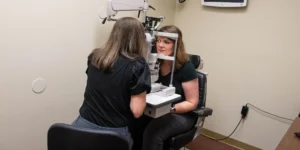Vision changes that come with aging are unavoidable. While there may be no stopping them, there are steps you can take to catch them early. This will allow you to get the treatment you need to keep your vision as clear and sharp as possible for years to come.
Floaters and flashes occur as the liquid in the eyes changes as we grow older. Presbyopia is when the lens of the eye becomes less flexible, making it difficult to see objects up close. Similarly, cataracts affect the lens of the eye due to the clumping of proteins. To catch these problems early and receive treatment, it’s important to get comprehensive eye exams on a regular basis.
1. Eye Floaters and Flashes
Chances are that you’ve noticed floating specks or even flashes of light at some point in your life. These are known as:
- Eye floaters
- Eye flashes
Eye floaters occur when strands or clumps of tissue form in the fluid of your eye (vitreous gel). When light hits your eye, they cause a shadow to form over the retina resulting in the floaters that you see.
Floaters can appear in different shapes such as:
- Circles
- Lines
- Specks
- Cobwebs
They are most visible when looking at a plain background, a blue sky, or a blank sheet of paper.
Eye flashes occur when the vitreous gel shrinks or changes in some way, pulling on the retina. This process separates the fluid from the retina, resulting in flashes of light. They appear as stars in your field of vision and can occur on and off for several weeks.
If you see a sudden onset of a lot of floaters, flashes that persist throughout the day, or feel like a portion of your vision is missing, this could mean you have a retinal tear or detachment. It is very important to get it diagnosed quickly and have it surgically repaired for a better visual outcome. We can recommend reputable eye surgeons to address this serious issue.
Read our blog on floaters and flashes to learn more!
2. Presbyopia
Presbyopia is a natural part of aging that makes it harder to see objects close up. The lens and cornea work together to focus reflected light, turning them into the images that we see. This requires the lens to be more flexible in order to focus on close-up objects. This process becomes more difficult since the lens hardens as time goes on.
The primary symptom is difficulty focusing on close-up objects, but it can be hard to notice since it develops slowly. You may begin to notice that small type in books and on your phone appear blurry. To compensate, you will have to hold them further away to see more clearly. This can put a major strain on your vision and cause headaches.
People begin to notice presbyopia symptoms in their early- to mid-40s. However, there are certain conditions that can cause the condition to develop earlier.
These conditions include:
- Diabetes
- Farsightedness
- Cardiovascular disease
- Multiple sclerosis
Developing presbyopia before the age of 40 is known as premature presbyopia. It can also occur due to certain types of medications including antidepressants, antihistamines, and diuretics.
To learn more about presbyopia and other refractive errors, check out our blog!
3. Cataracts
Like presbyopia, cataracts are a natural part of aging that affects the lens of your eye. While it can occur for other reasons, aging is the primary cause. Cataracts begin to develop around the age of 40 but symptoms don’t usually become noticeable until around age 60. It’s estimated that around 50% of Americans will have cataracts by the age of 75.
When the lens of an eye is healthy, it allows light to pass through to the retina without obstruction. As we get older, the proteins in the lens begin to break down and clump together, resulting in cataracts. These cataracts cause the lens of the eye to become clouded, thick, and inflexible.
Other cataract symptoms include:
- Double-vision
- Sensitivity to light
- Blurry or clouded vision
- Seeing halos around lights
- A faded yellow or brown tint to everything
- Frequent changes to your lens prescription
The end result is that your vision will become more clouded over time. Fortunately, this is a slow process that can take years to notice. On the other hand, a lack of diagnosis and treatment can cause you to live with blurry vision longer than necessary.
Check out our blog on diagnosing and treatment of cataracts!
Comprehensive Eye Exams in Knoxville, TN
Whether it’s one of the above conditions or another age-related eye problem, the best thing you can do is get a comprehensive eye exam. Vision changes that come with age can develop gradually and these in-depth exams are the best way to catch them early. This ensures that you get the treatment that you need as soon as possible and retain your ability to see clearly.
Unlike the vision screenings you may remember from school, comprehensive exams use dilating eye drops. This allows our Knoxville eye doctors to get a more in-depth look at the inner structures of your eyes and catch problems early. These types of screenings are about more than updating your prescription; they’re about providing complete eye health.
To read our complete guide to comprehensive eye exams, click here!
Your eyes aren’t only the window to the soul—they’re also the window to important insights into your overall health. Comprehensive eye exams can also detect health issues such as:
- Autoimmune diseases
- Diabetes
- Hypertension
Scheduling a comprehensive eye exam will do more than detect age-related changes to your vision. It will also help protect you from other health threats you may not have even been aware of.
Have you noticed age-related changes to your vision? Contact us today to schedule your Knoxville comprehensive eye exam!
The liquid in our eyes changes as we age, leading to increased eye floaters and flashes. The gradual hardening of the lens is known as presbyopia, making it harder to see up-close objects. Cataracts also affect the lens with clumping proteins that cause clouded vision. Comprehensive eye exams catch these issues early and help you receive much-needed treatment.
Hardin Valley Eyecare & Optical has been serving Knoxville since 2009. Located at 10904 Spring Bluff Way, you can schedule an appointment online or give us a call at (865) 888-0892.





